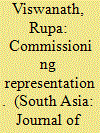| Srl | Item |
| 1 |
ID:
140463


|
|
|
|
|
| Summary/Abstract |
Commissions of inquiry are unique tools of modern governance that represent ‘the people’, but in a manner quite unlike parliaments and other forms of elected political representation. Using as its example the 2007 Misra Report, this paper reveals how, in the production of a commission report, scores of non-state actors—‘stakeholders’ from a wide range of social strata—are enlisted to produce the policies that will then redound upon those very stakeholders. In thus consulting the people and eliciting their speech, commissions serve to publicly enact, in a controlled setting, the deliberative ideal of democracy that is otherwise absent in India. In this particular instance, the problematic status of Dalits is subsumed under the normative religious identity of the post-colonial Indian nation, a conclusion whose emergence through reasoned debate is publicly enacted in the form of the commission.
|
|
|
|
|
|
|
|
|
|
|
|
|
|
|
|
| 2 |
ID:
191923


|
|
|
|
|
| Summary/Abstract |
Populism, as a mode of political logic, always has been a significant factor within Turkey’s political landscape, and it strongly is associated with right-wing political parties. The AKP’s conservative democratic populism and neo-right-wing mission arose as a sui generis governmental orientation out of the organic crisis of the Kemalist regime by articulating the collective political passion and the common affects it engenders in the populace. This article argues that right-wing populism developed as a transformative politics embracing neoliberal economics that subverted the anti-status quo through a counter-hegemonic discourse and electoral strategy. The AKP’s empty signifier is an example of radical negativity with its antagonistic division between a hegemonic power bloc (corrupt elites) and an excluded underdog (pure people). However, within a post-democracy conjuncture, the AKP adopted a new radical right-wing populism based on a Turkish-Islamic synthesis. The party’s electoral hegemony is crumbling and ruptured by an authoritarian and illiberal politics that has created a post-hegemonic populist moment.
|
|
|
|
|
|
|
|
|
|
|
|
|
|
|
|